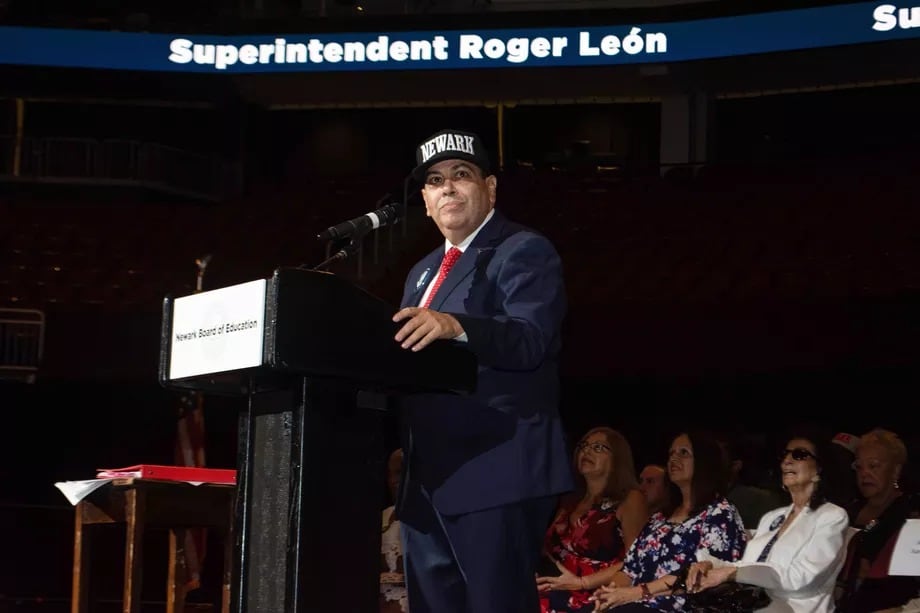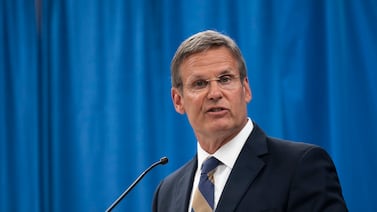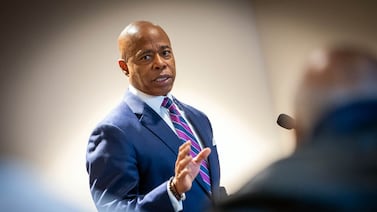Newark regained full control of its school system Wednesday, ending a decades-long state intervention that wrested power from the local community and fundamentally reshaped New Jersey’s largest district.
The milestone follows a two-year transition period during which the city’s elected school board was effectively in charge of the district yet remained subject to state oversight and strict guidelines. On Wednesday, the state Board of Education voted unanimously to finalize Newark’s return to home rule, declaring that the district had met the state’s requirements and earned its independence.
“We screamed for two decades: Give us back our schools,” said state Sen. M. Teresa Ruiz, who represents part of Newark.
“We know what we want, we know what we need, we know how to govern,” she added during the board’s virtual meeting. “Let’s show them the results.”
The Newark school system looks radically different today than when the state seized control of it 25 years ago. Student test scores and the graduation rate have markedly improved. But the district, which now enrolls about 38,000 students, shrank in size as the city’s charter schools grew. Charter schools, which arrived in Newark soon after the state’s takeover in 1995, now educate more than a third of Newark’s public school students.
State monitors who tracked the actions of the Newark school board and its chosen superintendent, Roger León, over the past two years said the district has continued to make “substantial and sustainable progress” during the transition period, officials said. On Wednesday, State Education Commissioner Lamont Repollet and several board members commended León, who attended Newark schools and has spent his entire career working in them.
After the state restored the Newark school board’s authority on a provisional basis in 2018, the board chose León as superintendent — making him Newark’s first locally selected district leader in more than two decades. Since then, he has pledged to expand social services for students, revamp low-performing high schools, boost attendance, and grow the district. He has started to deliver on some of his promises: The attendance rate has gone up and two new schools have opened with others on the way.
Amid the progress, Newark now faces the same monumental challenge as districts across the country: safely reopening school buildings during the coronavirus pandemic while continuing to educate some students remotely. Unlike some wealthier districts where home access to technology is more widespread, Newark must find a way to provide laptops and internet access to thousands of families even as the district receives less funding than the state’s own school-aid formula says it’s owed.
León did not dwell on the steep climb ahead after Wednesday’s vote, but rather celebrated the district’s long-awaited return to local control.
“This is an historic day for the great city of Newark,” he said, before vowing to help the city’s students realize their dreams. “I am living my dream right here and right now.”
The state’s oversight of Newark’s schools dates back to the 1980s, when officials began closely monitoring the district’s performance. By 1994, state investigators had produced a damning 1,110-page report describing a school system in chaos: While buildings crumbled and most students failed state tests, the school board was busy doling out jobs and contracts to associates and enjoying lavish meals and trips at the taxpayers’ expense, the state said.
The following year, a state judge signed off on the takeover, decrying “failure on a very large scale” within Newark’s schools and “nepotism, cronyism and the like” among the board. The state proceeded to disband the city’s school board. And on July 12, 1995, the district’s top officials were escorted out of the district’s headquarters.
“I was in the superintendent’s conference room on the day that the state walked in to take over Newark,” Anzella King Nelms, a former deputy superintendent, said in a 2018 talk. “It was a day that our hearts dropped.”
Newark was the third district to be taken over by the state, following Jersey City in 1989 and Paterson in 1991 — both of which remain under state oversight. While most Newarkers acknowledged their schools’ struggles, many also saw the state’s harsh intervention as politically and racially motivated. Domingo Morel, a political scientist at Rutgers University-Newark who has studied district takeovers, said the data support those claims.
New Jersey and other states were more likely to seize control of districts that served mostly Black students and where many municipal leaders were Black, he found. (More than 90% of Newark students are Black or Hispanic, and more than 80% qualify for free or reduced-priced lunch, a measure of poverty.)
The takeovers in Newark and other cities often followed court cases that boosted funding for high-poverty districts.
“It was a political battle between Democratic cities with Black political leadership and conservative state administrations,” he said. “Schools are such an important part of this because they represent the largest portion of city and state budgets.”
Following the takeover, the state controlled Newark’s schools for more than 22 years, handpicking superintendents who had the power to override the city’s elected school board. The intervention took a dramatic turn in 2010, when Gov. Chris Christie and Newark Mayor Cory Booker hatched a plan to overhaul the district using a $100 million gift from Facebook CEO Mark Zuckerberg. They appointed a hard-charging superintendent, Cami Anderson, who laid off hundreds of employees, closed several neighborhood schools, and oversaw the rapid expansion of the city’s charter schools.
Many residents resisted the changes and local leaders, including Mayor Ras Baraka, lobbied the state to return Newark schools to local control. In 2018, after gradually scaling back its intervention over several years, the state gave the Newark school board and district leadership authority over all aspects of the school system, including the curriculum, personnel matters, and the district’s more than $1 billion annual budget.
In order to maintain its authority, the district had to meet the requirements of a 73-page transition plan. The state appointed Nelms, the former district official, to guide Newark through the transition and monitor its progress.
Mary Bennett, who was the principal of Malcolm X Shabazz High School when the state took over the district, said it had been painful to watch state officials “come into your house and tell you they know what’s best for you.”
While some of the state-appointed superintendents enjoyed local support, others appeared “more committed to dismantling the district than improving it,” Bennett said, referring to the closure of traditional schools and growth of the charter sector. Even now as León tries to raise Newark schools to new heights, the decades of state control will not easily be forgotten, she added.
“You can’t go through that much change and that much tumult,” she said, “without some scars that you have to overcome later on.”
León himself expressed a similar sentiment at a school board meeting in May.
“I’m worried about how this system recovers,” he said, “not from COVID-19 — but from the state-operated school district.”
John Abeigon, president of the Newark Teachers Union, hailed the news of Newark’s return to home rule, for which the union had long advocated.
“The NTU congratulates Superintendent León and the [Newark Board of Education] for tossing off the last shackle of state control,” he said in a statement Wednesday. “We thank our community partners who fought beside us in the fight to regain local control.”








